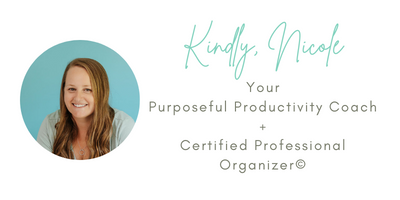**Trigger Warning**
In this blog, I discuss suicide prevention and share statistics. Please prioritize your mental health. If this topic is distressing, feel free to skip to the end or pass on this post. 🫶
————-
Hi Friends,
I hope everyone had a safe and enjoyable long weekend. Now that we’re back to reality, I want to get real with you. It’s officially September, which also means it’s Suicide Prevention Month. I talk a lot here and with my clients about mental health because it’s crucial—it’s our life. But today, I want to go deeper.
Whether I’m physically organizing someone’s home or coaching them on productivity, we often uncover heavy things that have been hidden, sometimes quite literally. There’s always a reason, a story, behind what brought them to me. And let me tell you, bringing these things to light—getting them off our chests and out of our lives—is such a relief. We can’t keep tough topics in the dark. This month, I’m reminded to talk about the hard stuff so we can feel less alone and connect more meaningfully. It’s not as daunting when we bring it to light and share.
So today, I’m going to talk about suicide. I’ll share some resources, issue you a challenge, and provide other important information. My goal is to raise awareness about the statistics and help you learn how you can support yourself or someone you love.
A Challenge to You
First, let’s correct an important misconception. In the past, people commonly said someone “committed suicide.” This phrasing is not only outdated but harmful. People commit crimes—they don’t commit suicide. Unfortunately, this term is still used in news reports and casual conversations. It carries a negative connotation, one that seems to blame the person rather than acknowledging the pain they were enduring.
So, here’s my challenge to you: STOP using that phrase. And when you hear or see someone else using it, kindly correct them. It’s a small but significant step towards changing the way we talk about mental health.
Surprising Statistics
The following information is taken directly from the Centers for Disease Control and Prevention (CDC) website:
- Suicide rates increased by approximately 36% between 2000 and 2022.
- Suicide was responsible for 49,476 deaths in 2022—about one death every 11 minutes.
- The number of people who think about or attempt suicide is even higher. In 2022, an estimated 13.2 million adults seriously thought about suicide, 3.8 million planned a suicide attempt, and 1.6 million attempted suicide.
- Suicide affects people of all ages. In 2022, it was among the top 9 leading causes of death for people ages 10-64.
- It was the second leading cause of death for people ages 10-14 and 25-34.
- Some groups have higher suicide rates than others, with rates varying by race/ethnicity, age, and other factors, such as where someone lives.
These statistics are heartbreaking. It’s especially difficult to learn that children as young as 10 are in such pain that they feel taking their own lives is the only option. If you’ve been fortunate enough not to be personally affected by suicide, it can be easy to overlook the magnitude of the problem.

Sometimes we’re surprised to learn that someone we know was hurting because we only saw the happy snippets of their life—whether on social media or in brief text messages. We’re constantly pulled in so many directions, and many things vie for our attention, often pulling us away from those in our lives who need deeper connections or even from ourselves when we need care. No one is at fault here; most of us are just trying to survive our own lives. But this month is a reminder to check in with our loved ones—and ourselves—and ask, “Are you okay?”
Resources
I know this is a lot to take in, and it’s not an easy topic to confront. But if you’ve read this far, I’m grateful. If you’d like to learn more about the impact of suicide and find resources to help prevent it, check out the links below.
- https://www.henryford.com/mimind/blog/language-matters
- https://afsp.org/community-programs/
- https://www.cdc.gov/suicide/resources/prevention.html
- https://www.nami.org/get-involved/awareness-events/suicide-prevention-month/
- https://www.rethink.org/advice-and-information/carers-hub/suicidal-thoughts-how-to-support-someone/
If you or someone you know is experiencing a mental health crisis, call or text 988 immediately.
You can also chat with the Suicide & Crisis Lifeline at 988lifeline.org.
Remember this is your tribe, your community too so reach out.
Sending you all some extra love today.
🫶🫶🫶
Stay tuned for next week’s POP Talk!





